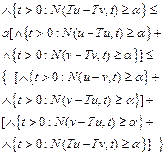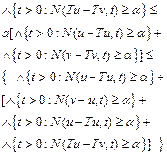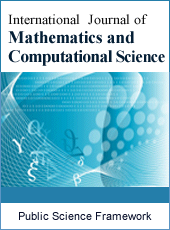Fixed Point Theorems in Fuzzy Normed Spaces for Weak Contractive Mappings
S. A. M. Mohsenialhosseini*
Faculty of Mathematics, Vali-e-Asr University, Rafsanjan, Iran
Abstract
We define fixed point for the class of weak contractive type mappings in fuzzy normed spaces. We obtain several convergence theorems for fixed points by means of Picard iteration on fuzzy normed spaces. These extend the corresponding results in literature by providing error estimates, rate of convergence for the used iterative method as well as results concerning the data dependence of the fixed points on fuzzy norm spaces.
Keywords
Fuzzy Normed Space, Fuzzy Fixed Point, Weak Contraction, Convergence Theorem
Received: April 6, 2015 / Accepted: April 22, 2015 / Published online: May 11, 2015
@ 2015 The Authors. Published by American Institute of Science. This Open Access article is under the CC BY-NC license. http://creativecommons.org/licenses/by-nc/4.0/
1. Introduction
Nowadays, fixed point play an important role in different areas of mathematics, and its applications, particularly in mathematics, physics, differential equation. For details, one can refer to, Amann, [1] Franklin, [2] Mohsenalhosseini et al. [3]. Since fuzzy mathematics and fuzzy physics along with the classical ones are constantly developing, the fuzzy type of the fixed point can also play an important role in the new fuzzy area. Some mathematicians have defined fuzzy norms on a vector space from various points of view [4], [5].
Chitra and Mordeson [6] introduce a definition of norm fuzzy and thereafter the concept of fuzzy norm space has been introduced and generalized in different ways by Bag and Samanta in [7], [8], [9].
In this paper, starting from the article of Berinde [10], we study some well-known contractive type mappings on fuzzy normed spaces, and we give some fuzzy approximate fixed points of such mappings.
2. Some Preliminary Results
Throughout this article, the symbols ∧ and ∨ mean the min and the max, respectively. We now start our work with the following:
Definition 2.1. [7] Let U be a linear space on ![]() A function
A function ![]() is called fuzzy norm if and only if for every
is called fuzzy norm if and only if for every ![]() and for every
and for every ![]() the following properties are satisfied:
the following properties are satisfied:
(F1) : ![]() for every
for every ![]() ,
,
(F2) : ![]() if and only if
if and only if ![]() for every
for every ![]() ,
,
(F3) : ![]() for every
for every ![]() and
and ![]() ,
,
(F4) : ![]() for every
for every
![]() ,
,
(F5) : the function ![]() is nondecreasing on
is nondecreasing on ![]()
and ![]() .
.
(F6) : ![]()
![]()
(F7) : The function ![]() is continuous for every
is continuous for every ![]() , and on subset
, and on subset ![]() is strictly increasing.
is strictly increasing.
Let ![]() be a fuzzy norm space. For all
be a fuzzy norm space. For all ![]() we define
we define ![]() -norm on
-norm on ![]() as follows:
as follows:
![]() (1)
(1)
for every ![]()
Definition 2.2. [11] Let ![]() be a fuzzy normed space,
be a fuzzy normed space, ![]()
![]() and
and ![]() The
The ![]() is a
is a ![]() -approximate fixed point (fuzzy approximate fixed point) of
-approximate fixed point (fuzzy approximate fixed point) of ![]() if for some
if for some ![]()
![]()
Definition 2.3. [11] A mapping ![]() is a F-Kannan operator if there exists
is a F-Kannan operator if there exists ![]() such that
such that

for all ![]()
3. Fuzzy Fixed Point
Definition 3.1. A mapping ![]() is called
is called ![]() -weak contraction or
-weak contraction or ![]() -contraction if there exist a constant
-contraction if there exist a constant ![]() and some
and some ![]() such that
such that
 (2)
(2)
for all ![]()
Remark 3.2. Due to the symmetry of the distance, the weak contraction condition (2) implicitly includes the following dual one
 (3)
(3)
for all ![]()
Remark 3.3. In the rest of the paper we will denote the set of all ![]() -fixed points of
-fixed points of ![]() by
by
![]() (4)
(4)
for some ![]()
Proposition 3.4. Let ![]() be a fuzzy normed space and
be a fuzzy normed space and ![]() is an
is an ![]() -weak contraction. Then
-weak contraction. Then
1) ![]()
2) The Picard iteration ![]() given by
given by
![]()
converges to ![]() for any
for any ![]()
3) The following estimates
A)  (5)
(5)
for ![]()
B)  (6)
(6)
for ![]()
hold, where ![]() is constant.
is constant.
Proof: Let ![]() be the Picard iteration, starting from
be the Picard iteration, starting from ![]() arbitrary. Then by (2) we have
arbitrary. Then by (2) we have

By the Picard iteration of ![]() , we have
, we have

By induction
![]()
and hence
![]()
which yields
 (7)
(7)
all![]() Since,
Since,
![]()
from (7) we obtain
 (8)
(8)
Now by letting ![]() in (8) and (7) we obtain the estimates (5) and (6), respectively.
in (8) and (7) we obtain the estimates (5) and (6), respectively.
Proposition 3.5. Let ![]() be a fuzzy normed space and
be a fuzzy normed space and ![]() is an
is an ![]() -weak contraction for which there exist
-weak contraction for which there exist ![]() and some
and some ![]() such that
such that
 (9)
(9)
for all ![]() Then
Then
1) ![]() has a unique
has a unique ![]() -fixed point, i.e.
-fixed point, i.e. ![]()
2) The Picard iteration ![]() given by
given by
![]()
converges to ![]() for any
for any ![]()
3) The a priori and a posteriori error estimates
A)  (10)
(10)
for ![]()
B)  (11)
(11)
for ![]()
hold.
4) The rate of convergence of the Picard iteration is given by
 (12)
(12)
Proof: Let ![]() be the Picard iteration, starting from
be the Picard iteration, starting from ![]() arbitrary. Then by (2) we have
arbitrary. Then by (2) we have

By the Picard iteration of ![]() , we have
, we have

By induction
![]()
and hence
![]()
which yields
 (13)
(13)
for all![]() Since,
Since,
![]()
from (13) we obtain
 (14)
(14)
Now by letting ![]() in (14) and (13) we obtain the estimates (10) and (11), respectively.
in (14) and (13) we obtain the estimates (10) and (11), respectively.
Again, by (2) we have
 (15)
(15)
where ![]() ,
,![]() .
.
Take ![]() in (15) to obtain
in (15) to obtain

that is, the estimate (12).
Remark 3.6.Note that, by the symmetry of the distance, (9) is satisfied for all ![]() if and only if
if and only if
 (16)
(16)
also holds, for all ![]()
Corollary 3.7. Let ![]() be a fuzzy normed space and
be a fuzzy normed space and ![]() is an F-Kannan operator Then
is an F-Kannan operator Then
1) ![]() has a unique
has a unique ![]() -fixed point, i.e.
-fixed point, i.e. ![]()
2) The Picard iteration ![]() given by
given by
![]()
converges to ![]() for any
for any ![]()
3) The a priori and a posteriori error estimates

for ![]()

for ![]()
hold.
4) The rate of convergence of the Picard iteration is given by

Proof: By Definition 2.3. and triangle rule, we get

Therefore

Then

for all ![]() i.e., in view of
i.e., in view of ![]() Definition 3.1. holds with
Definition 3.1. holds with ![]() ,
,![]() .
.
Since F-Kannan operator is symmetric with respect to ![]() and
and
![]() (3) also holds. In a similar way, by the same Definition 2.3. and triangle rule, we get
(3) also holds. In a similar way, by the same Definition 2.3. and triangle rule, we get

Therefore

Then

for all ![]() which shows that (9) and (16) hold with
which shows that (9) and (16) hold with ![]() ,
,![]() .
.
Acknowledgments
The authors are extremely grateful to the referees for their helpful suggestions for the improvement of the paper.
References
- H. Amann, Fixed point equations and nonlinear eigenvalue problems inor4'ed Banach spaces, SIAM Rev., 18(2) (1976), 620-709.
- J. Franklin, Methods of Mathematical Economics, Springer Verlag, NewYork, (1980).
- S.A.M. Mohsenalhosseini, H. Mazaheri, M.A. Dehghanand M. Bagheshahi,"Application of Approximate Best Proximity Pairs," Gen. Math. Notes, Vol. 7, No. 1, pp.59-65, 2011.
- S. V. Krishna and K. K.M. Sarma, "Separation of fuzzy normed linear spaces," Fuzzy Sets and Systems, vol. 63, no. 2, pp. 207-217, 1994.
- J.-z. Xiao and X.-h. Zhu, "Fuzzy normed space of operators and its completeness," Fuzzy Sets and Systems, vol. 133, no. 3, pp. 389–399, 2003.
- A. Chitra, P.V., "Mordeson, "Fuzzy linear operators and fuzzy normed linear spaces,"Bull. Cal. Math.Soc, vol. 74, pp. 660-665, 1969.
- T. Bag, S. K. Samanta, "Finite dimensional fuzzy normed linear spaces,"J. Fuzzy Math, vol. 11, no. 3, pp. 687-705, 2003.
- T. Bag, S. K. Samanta, "Fuzzy bounded linear opera- tors,"Fuzzy Sets syst, vol. 151, no. 3, pp. 513-547, 2005.
- T. Bag, S. K. Samanta, "Some fixed point theorems in fuzzy normed linear spaces," Information Sciences, 177 pp. 3271-3289, 2007.
- V. Berinde, "On the Approximation of Fixed Points of Weak Contractive Mappings," Carpathian J. Math, vol 19, no. 1, pp. 7-22, 2003.
- S. A. M. Mohsenalhosseini1 and H.Mazaheri, " Approx- imate Fixed Point Theorems in Fuzzy normed Spaces s for an Operator," Advances in Fuzzy Systems, Volume 2013, Article ID 613604, 8 pages.



